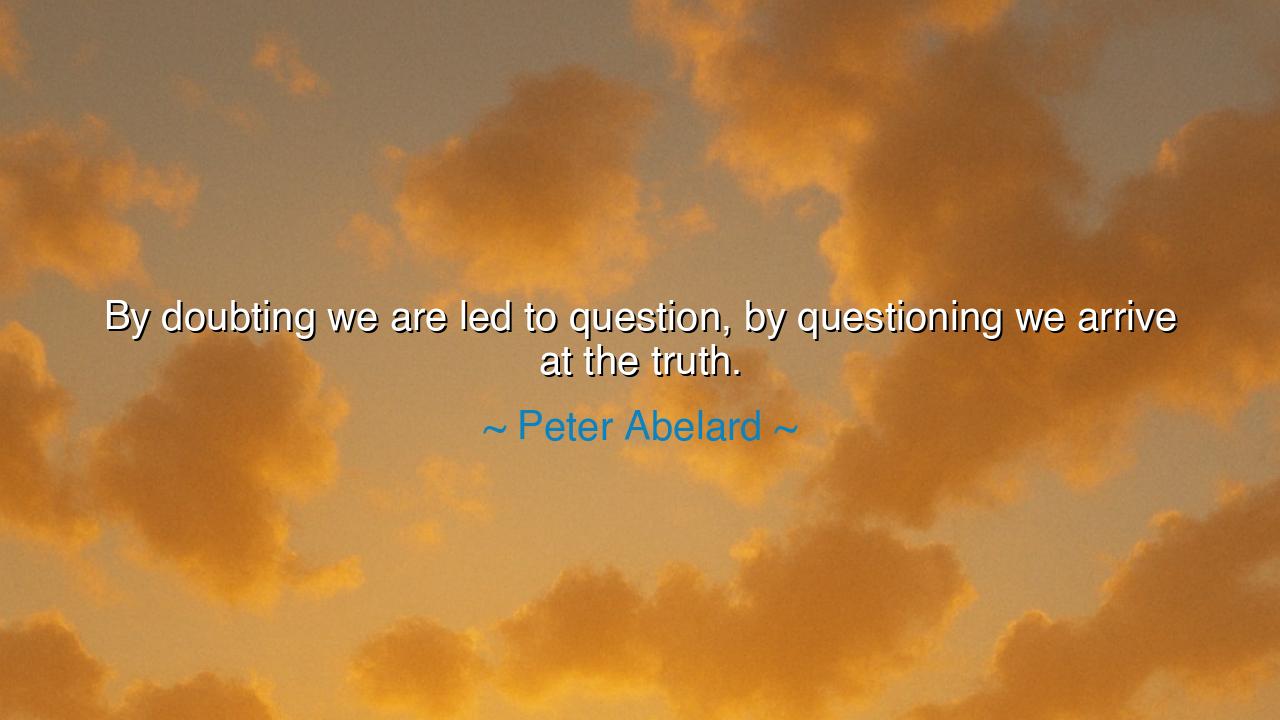
By doubting we are led to question, by questioning we arrive at






Peter Abelard, the brilliant yet controversial philosopher of the Middle Ages, once declared: “By doubting we are led to question, by questioning we arrive at the truth.” These words, born of his restless spirit and sharp intellect, echo across centuries as both a warning and a beacon. For Abelard lived in an age where authority was rarely challenged, where knowledge was often handed down unquestioned. Yet he dared to suggest that doubt—so often feared as dangerous—was in fact the beginning of wisdom.
The meaning of his words lies in the path of inquiry. Doubt shakes us from blind acceptance; it disturbs the comfort of ignorance. When we begin to doubt, we are compelled to question—to search, to examine, to test. And through that questioning, we draw nearer to truth, stripping away falsehoods and illusions. Abelard’s insight is that truth is not simply given to us—it must be pursued, wrestled with, even at the cost of uncertainty and struggle.
Abelard’s own life was a testament to this principle. He challenged the great thinkers of his time, questioning their arguments and daring to reason where others merely repeated tradition. His method of doubt and inquiry laid the groundwork for scholasticism, influencing generations of scholars who would shape the intellectual revival of Europe. Yet his boldness also brought him enemies, and he suffered exile, humiliation, and even personal tragedy. Still, through his life’s pain, the flame of his philosophy endured: that to question is not to betray truth, but to honor it.
History gives us many examples of this wisdom. Galileo, centuries later, doubted the long-accepted belief that the Earth stood at the center of the cosmos. His doubt drove him to question, and his questions, guided by observation, revealed the truth of a vast universe. Though condemned in his own time, his method of inquiry birthed modern science. Here again we see Abelard’s path: doubt leads to questions, and questions to truth, though often at great personal cost.
The same spirit is found in Socrates, long before Abelard. Socrates doubted the wisdom of the powerful, and by questioning, revealed the shallowness of their knowledge. His method—the relentless asking of questions—became the cornerstone of philosophy. Yet like Abelard, he paid the price for his courage, condemned to death for corrupting the youth. Still, his legacy shows that truth is too strong to be silenced, and doubt too essential to be destroyed.
The lesson for us is clear: do not fear doubt, for it is not the enemy of truth but its servant. To accept everything without question is to remain blind; to doubt is to open the eyes, even if the light at first burns. But do not stop at doubt—move forward into questioning, into seeking, into testing. Only then will you arrive at the strength of truth, a truth not borrowed from others, but earned by your own struggle.
Practical action follows naturally. When faced with teachings, traditions, or even your own assumptions, do not swallow them whole. Ask: Is this true? What lies beneath? How can I test it? Read widely, listen carefully, and never silence the voice of honest doubt. Yet balance doubt with humility, knowing that the purpose of questioning is not to destroy, but to discover.
Thus, Abelard’s words endure as a torch for all seekers: “By doubting we are led to question, by questioning we arrive at the truth.” Let this be your guide. Doubt bravely, question deeply, and pursue truth relentlessly. For though the path may be hard, it is the only path that leads the soul from shadows into light.






VHVuong Hoang
Abelard’s quote challenges the conventional view that certainty is the path to knowledge. It makes me wonder, if questioning leads us to truth, what role does intuition or experience play in the process? Is it possible that some truths can be discovered without going through a long cycle of doubt and questioning, or is doubt the only reliable path to true understanding?
Mmimi
I find it interesting that Abelard connects doubt with truth. Often, we think of doubt as something that hinders our understanding, but in this context, it seems to be a driving force for deeper insight. Is it possible to have too much doubt? Or does it simply depend on how we manage and direct that questioning? Can we ever be truly sure that our questions are bringing us closer to the truth?
GDGold D.dragon
Abelard’s quote suggests that without doubt, we would never be led to question the world around us. It’s almost like saying that doubt is the catalyst for intellectual progress. But does this mean that everyone who doubts will eventually discover truth, or are some questions impossible to answer? How do we know which questions are worth asking and which ones might just lead to more confusion?
TDLai Thuy Dun
I really like Abelard’s idea that doubt and questioning lead us to truth. It reminds me of how, in science and philosophy, most discoveries and advancements come from the willingness to challenge what we think we know. But how far should we go with questioning? Can we ever stop asking questions, or is the pursuit of truth a never-ending cycle of doubt and inquiry?
OSTran On Sinh
This quote makes me think about how doubt is often perceived negatively in many aspects of life. But Abelard presents it as a necessary part of the journey to truth. Does that mean we should embrace doubt rather than fear it? How do we know when our doubts are leading us toward meaningful questions, or if they’re just clouding our judgment and delaying our progress?